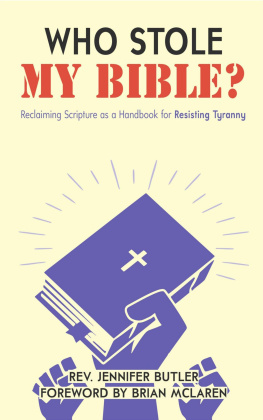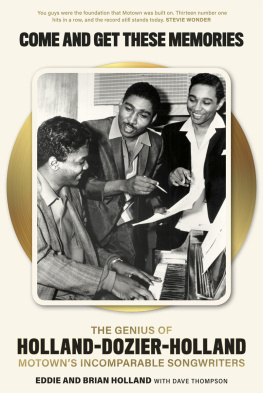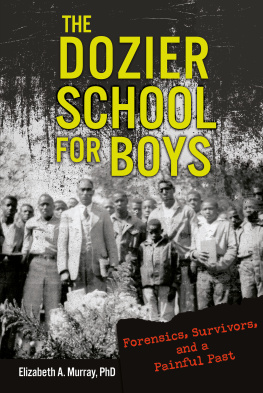The Dream of God
THE
DREAM
OF GOD
A Call to Return
Verna J. Dozier

Copyright 2006 by Verna J. Dozier
All rights reserved.
No part of this book may be reproduced, stored in a retrieval system, or transmitted in any form or by any means, electronic or mechanical, including photocopying, recording, or otherwise, without the written permission of the publisher.
Library of Congress Cataloging-in-Publication Data
Dozier, Verna J.
The dream of God: a call to return / Verna J. Dozier.
p. cm.
Originally published: Cambridge, Mass.: Cowley, c 1991.
Includes bibliographical references. ISBN 978-1-59628-015-1
1. Mission of the church. 2. Christian life. 3. Bible
Criticism, interpretation, etc. I. Title.
BV601.8.D68 2006
262dc22
2006000466
Seabury Books
445 Fifth Avenue
New York, NY 10016
www.seaburybooks.org
An imprint of Church Publishing Incorporated
TO MY SISTER LOIS
a ministering angel

TABLE OF CONTENTS
CHAPTER ONE
The Dream of God
CHAPTER TWO
The Biblical Story
CHAPTER THREE
The Rejection of the Dream
CHAPTER FOUR
The Temptations of the Church
CHAPTER FIVE
The Persistence of the Dream

ACKNOWLEDGMENTS
T he ideas in this book crystallized in lectures I was asked by Buzz March to give for the annual Advent Lecture Series for my parish, St. Marks of Capitol Hill, Washington, D. C Ray Hartzen videotaped the lectures, while Michael Hopkins, Louise Lowe, and Bart Lloyd read the transcripts and made valuable suggestions in response to my desire to turn the lectures into a book. Susan and Raymond Rich gave generously of their time, resources, and computer skills to prepare the manuscript for the journey to publication under the steady guidance of Cynthia Shattuck, whom I consider a gifted editor and claim as a friend.
I consider myself wealthy in my friends. I wish I could name all whose faithful interest and loving support sustained me in this enterprise. I thank Dee and Al Hahn Rollins, Jan Hoffman, Randall Day, and Loren Mead of the Alban Institute in the name of them all.

Chapter One
THE DREAM OF GOD
See, I have set you this day over nations and over kingdoms,
to pluck up and to break down,
to destroy and to overthrow,
to build and to plant. (Jeremiah 1:10)
Gracious Father, we pray for thy holy Catholic Church. Fill it with all truth, in all truth with all peace. Where it is corrupt, purify it; where it is in error, direct it; where in any thing it is amiss, reform it. Where it is right, strengthen it; where it is in want, provide for it; where it is divided, reunite it; for the sake of Jesus Christ thy Son our Savior. (The Book of Common Prayer, 816)
W hat is your book going to be about? I was asked by a very intelligent and learned man whose knowledge and skill were sought after by universities on both sides of the Atlantic, and much valued as well in the councils and committees of his denomination.
Its going to be about how I think the institutional church has missed the mark of what it ought to be about, I replied.
The institutional church? he puzzled. What other church is there?
The people of God, I replied. The baptized community.
But how would they function without an institution? he smiled.
Aye, theres the rub, as Hamlet would say. The little band, the church of St. Pauls day, needed an organization, a structure, an institution to maintain itself but the institution took over the little band. As Hendrik Kraemer wrote in A Theology of the Laity, most of us tend to think of the church in terms of ministers and clergy, not the people of God.
The prayer with which I began is a prayer for the church as institution, and the genius of this prayer for me is that it knows all is not right with the institution. The church can be corrupt. It can be in error. It can be amiss. Institutions, however, do not take kindly to having those possibilities pointed out!
Jeremiahs call to root out, pull down, destroy, and throw down is an awesome call. It can only be undertaken in the light of the complete callto build and to plant.
The only reason for me to write a book about how the church has failed to be what it is called to be is to hold up again the vision of what it is called to be in the biblical storythe dream of God. The institution has missed its high calling because we the people have missed ours. This book is really about how the people of God have missed the mark, and the institution is only the starting point.
I believe that Jesus of Nazareth is the Messiah, he by whom the reign of God has been made knownand he whom the institutional church, from the resurrection community to the present day, has rejected since the day of his death in favor of something more reasonable, more controlled and more controllable, more human. In other words, I believe Christianity has journeyed far from what Jesus of Nazareth was about.
Of course I am not the first to think that, but my thesis is drawn from what I believe the biblical message to be: God calls a people to be the new thing in the world the people of God. The new dispensation, the people of the Way, as the first Christians were called, has missed its high calling even as did the first dispensation, the people of the Torah. The proof of that argument rests with what the church, the institution, has done to the ministry of the laity. The people of the Torah made the gracious gift of the law into a system. The people of the resurrection made the incomprehensible gift of grace into a structure.
Both the people of the Torah and the people of the resurrection were escaping from Gods awesome invitation to be something new in the world. I think God was always offering the possibility of living in the kingdom of God in the midst of the kingdoms of this world. Each time the frighteningly free gift of God to be the new thing in the worlda witness that all of life could be different for everybodythis gift was harnessed by an institution that established a hierarchy of those who know above the great mass of those who must be told. Each time the world where people lived and worked and had families and friends and wrestled with day-to-day decisionsthis world was out of the sight of the holy places. A veil was in the Temple; a rood screen in the cathedrals.
It will take me some time to develop that idea, to trace what I believe is the sorry journey of the people of God from Us to Me, the privatization of religion, a movement away from the dream of God. First, we need to consider what I call the dream of God, what the biblical story is about. Second, we need to think about the rejection of that dream, the three falls. (Of course, human beings are falling all the time, but these three falls are, as I see them, the great symbolic acts.)
What I see as the first fallwhat we have termed the Fallis the moment recounted in Genesis when the First Man and the First Woman, Adam and Eve, chose to live another way than the way God had planned for them. That characteristic of any fallthe choice against God, the choice for the way of the worldis clearly evident in what I call the second fall, the choice of the children of Israel to have a dynasty of kings like the other nations, instead of what seemed to the people to be Gods quixotic system of judges over Israel.









